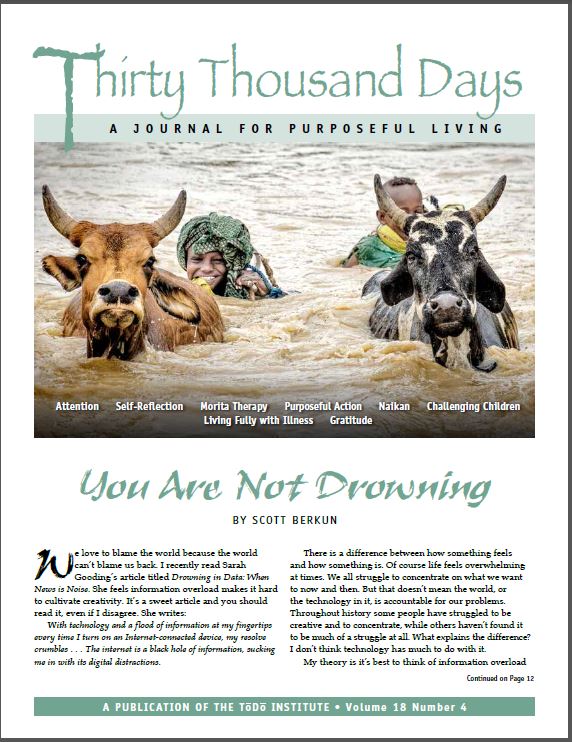Make Effort, Not Outcomes, Your Focus
by Gregg Krech
Whenever we’re facing a challenging situation, one of the wisest things we can do is take a few minutes to distinguish between what’s controllable and what isn’t controllable. This is one of the key elements of psychiatrist Shoma Morita’s work and it’s an example of how something very simple can also be very helpful. I suggest you use a pencil and paper. Simply divide the piece of paper into two columns and, as you reflect on the situation, place each element into the proper column. What you end up with is a “map” that shows you what you can work on (actions which are controllable by you) and what you can’t control. This empowers you to move forward and do what you can do.
This exercise is also helpful when considering our dreams and aspirations. We live in a goal-oriented culture and we receive encouragement to identify goals, write them down, and work towards them. There’s nothing inherently wrong with this, except that we can quickly find ourselves attached to the goals themselves, which are generally outcomes. And outcomes, in most cases, are uncontrollable. Finding a job, losing weight, getting a book published or finding someone for an intimate relationship are examples of outcomes which you really can’t control. When these outcomes become our main focus, we implicitly define success based on whether we accomplished something outside our control. So sometimes we are successful, and sometimes we aren’t.
The alternative is to focus on the effort we make. Our effort is almost always controllable – an action, something we can do. Let’s take the example of finding a job. The outcome, of course, is getting hired. But we certainly can’t control getting a job offer, no matter how hard we try or how well we present ourselves. Instead, we need to keep our focus on making the best effort possible. We create a professional resume, network with others, and send lots of applications with tailored cover letters. We make phone calls and follow-up. We show up for interviews on time and prepare for them. If we do all this, and more, will we get a good job? Well, there’s still no certainty we’ll get hired for any job. But if we’ve done everything we can do, and we’ve done it to the best of our ability . . . that can be our measure of success.
Most of us would like the assurance that if we just work hard enough towards a goal, we’ll accomplish it. But it doesn’t always work that way. We have to accept the limits of our human control over the world. We have to accept the uncertainty of the way our life unfolds. Attachment to our goals traps us into a life of seeking more and more control which not only creates disappointment, but creates an ongoing source of pressure and stress.
A second benefit of moving from a focus on goals to a focus on effort, is that it naturally moves us from focusing on the future to focusing on the present. Goals are what we desire or hope will happen in the future. Goals have a distance between our life as it is and life as we hope it will be. But our effort is what we’re doing now! And when we move from the future to the present, we move from the imaginations of the mind to the grounded reality of real life. Suppose we wish to take a trip around the world. What can we do right now? Open a savings account. Investigate special round-the-world airfares. Action is the present is our real life.
And finally, when we are truly focused on effort, rather than outcomes, we find it easier to resist the temptation to abandon our integrity. When we’re preoccupied with a particular outcome, it’s natural to lose site of our morals and values. If we have to bend the truth a bit, that’s OK because what’s important is getting the outcome we want. In essence, the end justifies the means. But if our focus is on effort, then “how” we move forward is of great importance. We consider the impact of our actions on others. We consider values such as honesty, loyalty or generosity. What does it mean to handle the situation with integrity?
So the next time you consider a goal or dream, come back to the present circumstances of your life and take a constructive step forward. Make your effort the focus of your attention. Make an effort which is sincere, attentive, persistent and thorough. Once you’ve done that, leave the outcome to life (or God or Buddha). There are too many influences to know, with any certainty, how things will unfold. Even a strong, well-built ship can be blown off course. We have to find a way to enjoy the journey, even when we don’t get the results we hoped for. Sometimes, those surprising, unhoped-for results are a real blessing. Then we realize that life can be worthwhile without us being in control. And that opens the doorway to faith.
Tags: All Members








